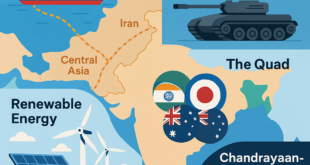As of the earlier times where states faced each other on the battle fields, and were expanding their territory, military, economic, political power from their opponent states whereas of time period the things has been modernized and digitalized so the states are now no longer in traditional wars they now do digital espionage, and gather their information and secrets and then leak it and to this these states also appoint hackers to hack the opponent state’s data.In today’s interrelated world cyber security became a main battlefield in geopolitics.
With states heavily depend on digital infrastructure for political, economic, and military actions, cyber threats have progressive into modern tools for espionage and warfare. Digital espionage and information warfare are the two main elements of digital cyber security, forming international relations and the security policies.
Governments, intelligence agencies, and even the non-state actors also took benefit from the instabilities in cyber space to gain the strategic advantage, to spread tension in opponent states to control the public discrimination. As cyber threats continue to spread, nations must have adopted the advanced cyber security services to protect their interests.
Digital espionage: The invisible battle fields
Digital espionage or cyber espionage involves the secret gathering of sensitive information from foreign governments, corporations or individual through digital devices.
Unlike traditional espionage which depends on the human agents or spies or the physical infiltration, cyber or digital espionage can be done from far away means can be done from one state in another state and even from one continent in another continent, which makes it difficult to expose and to detect the specific actors.
Governments and intelligence agencies install modern malware, spyware and hacking tactics and techniques to steal classified information, intellectual property, and technological secrets.State promoted cyber or digital espionage is a major concern in international relations.
States like America, China, Russia, and Iran to gain political and economic benefit are accused of cyber espionage campaign, such as APT10 of China, Russia’s Fancy Bear, North Korea’s Lazarus Group they have targeted the governmental organizations, military industry, economical organization, and investigative organizations, they are the defamed digital espionage campaigns.
These cyber-attacks often use the software weakness phishing attacks, and access to confidential date, they took advantage of these inside threats.Cyber espionage is not limited to only states but private companies and individual also targeted.
Information warfare: Manipulating public perception
Information warfare which is also known as cyber propaganda or impactful actions is the crucial element of cyber security.
Unlike cyber espionage, which is focused only on the stealing of information, information warfare aims to control public opinion, ruin political processes and create social divisions. This can be achieved through mislead information, deep fake videos, misinformation, fake news, and social media manipulation. As in information warfare there is no need of specific power.
Nations engage in information warfare to weaken opponents without direct military clash. Russia’s involvement in the 2016 U.S presidential elections is one of the most well-known recorded cases of cyber influence actions. Russian secret agents used social media platforms, bots, and cyber propaganda cells to spreads disinformation, create fake accounts centralized American society
.The rise of artificial intelligence (AI) which has been now in these recent years, and machine learning has made information warfare more dangerous. Cyber actors create realistic deep fake videos which manipulate the public and can defame or ruin the reputation of political personalities. Bots working through AI can cause or spread the misleading information from which it will be difficult to people to differentiate whether the information is real or fake. This has led to concern about the impact of cyber influence campaigns on democratic processes, national security, and international stability.
The future of cyber security in Geopolitics
As digital espionage and information warfare become more modernized, nations must build up their cyber security defences. Governments look over the cyber security infrastructure, developing advanced threat monitoring systems, and apply stricter rules and regulations to protect critical data and information.
Cyber threats got addressed by international cooperation. Organizations like NATO, United Nation, and European Union are working on worldwide cyber security structure to control cyber aggression and establish rules and regulations for responsible state behaviour and attitude in cyber space.In Geopolitics, cyber security can be seen as an ongoing arm race.
While nations develop stronger defences, cyber rivals continue to develop their strategy. The future of worldwide security relies on the ability of countries to change to come up cyber threats, protect their digital sovereignty, and prevent cyber wars or conflicts from climb up into actual wars.
Mishal Khan Afridi , Karachi
 Top Trends Blogs
Top Trends Blogs




